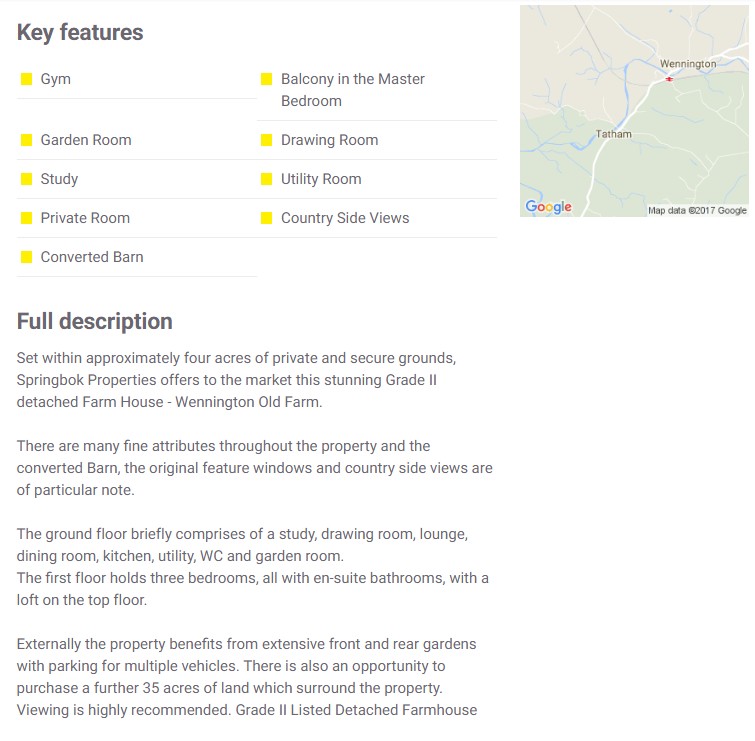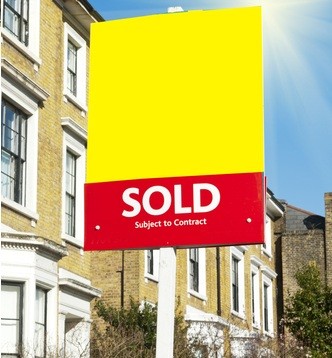
I'm a property expert that still remembers the days when having broadband was a selling point! My articles cover issues that homesellers face in the UK and answer the questions we're all asking. I've bought and sold properties and helped others do the same, so my writing comes from years of experience.
Read Full Bio >Selling a house, whether online or through traditional methods, can come with its own set of challenges. As any good agent will tell you, there are clear dos and don’ts that can make all the difference. At Springbok, we often see sellers making the same common mistakes when selling their home, often without realising it. From misunderstanding what not to fix when selling a house, to saying the wrong thing during viewings, these errors can slow down the process or even derail a sale entirely.
To help you, we’ve put together 21 mistakes that we’ve seen time and again during the sales process, and added advice on how you can avoid making them. Here we go…
Mistake 1 – Failure to prepare
You might be thinking, “I want to sell my house fast!”, but the first and most important rule is preparation. Failing to properly prepare is one of the most common mistakes people make when selling their home. All the small things you might easily overlook – such as repairs, staging, or cleaning – can stand out as glaring issues to potential buyers.
Proper preparation means ensuring your home appeals to the widest audience. This includes everything from choosing the right estate agent, taking quality photos, marketing, and knowing what not to fix when selling a house in the UK. Some repairs may not be worth the investment, so only focus on the ones that will make a real difference. Remember, there’s no second chance to make a first impression!
Keep the mantra ‘prepare properly, and I’ll sell my house fast’ in mind whenever you feel tempted to dive in unprepared.

Mistake 2 – Pricing incorrectly
Pricing your property correctly is key to understanding how to sell your house successfully. Setting the wrong price from the outset can prevent your sale from even happening. Too often, sellers let emotions dictate their pricing or choose a figure well above current market rates, hoping for a better offer.
However, buyers aren’t naive. They research prices and know the limits of their budget. Even if your agent suggests a high price, this doesn’t automatically lead to better offers. In fact, it’s the competition generated by a realistic price that will drive interest. Make sure you get your property valued by a regional expert who understands recent sales, market trends, and what you can realistically achieve. Not knowing the right price is one of the most common mistakes when selling a property.

Mistake 3 – Being ‘too present’ at viewings
When showing potential buyers around your property, it’s important to follow a few simple rules.
Say little, be positive, and stay out of the way.
Buyers will already feel like they’re invading your personal space, and if you’re too present, they’ll feel restricted, which can leave them with a less favourable impression.
Another common pitfall is over-explaining or pointing out every feature of your home. You might even say something you shouldn’t, such as revealing personal reasons for selling or hinting at major issues with the property. If you’re wondering what should you not say when selling a house, the answer is, anything that could weaken your negotiating position. You should always be honest so don’t deliberately lie, but try to keep things light and let the property speak for itself. For more on this, scroll down to ‘mistake 18’.
If you must attend viewings, be quietly positive. Show them the best parts of your home first and last, and give the prospective buyers the space to explore and decide for themselves.

Mistake 4 – DIY selling
Choosing to sell your house on your own might seem like a way to save money, but it can often end up costing you more in the long run. Managing your own listing, viewings, and negotiations can limit your exposure to the right buyers, and that’s only the beginning.
You’ll still have to handle valuations, due diligence, surveys, legalities, chasing solicitors, and much more. These tasks are time-consuming and can be overwhelming if you’re not familiar with the process.
While hiring a professional might seem costly, their experience and local market knowledge make it an investment that pays off. Avoid the stress of DIY selling and let an expert help you avoid common mistakes when selling your home.

Mistake 5 – Hiring the wrong agent
It’s crucial to do your homework on an agent before you instruct them. Check their performance, reviews, and track record. Are they honest, professional, and responsive? Little details, such as whether they call when they say they will and show up on time for appointments, can reveal a lot about their reliability.
While fees are important, don’t be swayed solely by cost. And beware of hidden costs. If the initial fee is unusually low, you might end up paying extra for essential services, like marketing or photography. Choosing the right agent is crucial to avoid the common mistakes when selling your home, so do your due diligence and pick someone who can meet your needs and goals.

Mistake 6 – Overdoing repairs and over-upgrading
Repairing your property might be necessary if you want to ‘prepare properly, sell house fast’, but knowing what not to fix when selling a house in the UK is just as important. Overdoing repairs or making costly upgrades that don’t fit the local market can actually backfire.
Shoddy or unnecessary repairs can make buyers suspicious, giving the impression that you’re hiding a larger issue. Similarly, flashy or expensive upgrades that don’t fit in with the area can come across as trying too hard and may actually deter potential buyers.
The best approach is to consult with your agent to determine which repairs will add value.
Of course, if you’re using a fast sale cash buyer, you won’t have to make any repairs because these companies usually buy any property in any condition. However, if you are needing to make repairs, stick to the essentials and avoid last-minute upgrades unless they’re recommended by a professional. (The smell of fresh paint is a dead giveaway that something has been done and it might look like you’re trying to cover up a problem).
If you’ve already extended or renovated your property, be prepared to answer buyers’ questions about planning permission, maintenance costs, and any ongoing issues.

Mistake 7 – Not marketing
It might sound obvious, but if nobody knows you’re selling, nobody can buy. Effective marketing is crucial when selling a house, and relying on outdated methods like placing a photo in the local newspaper ad is no longer enough. One of the common mistakes when selling your home is not ensuring that your property is marketed to the widest audience possible.
Your agent should be using multiple forms of marketing to get your property noticed. This means listing it across various popular online platforms, targeting investors, and showcasing it to millions of potential buyers. Ask your agent directly how they plan to market your property, and if their strategy doesn’t involve extensive online and offline marketing, it’s time to ask why.

Mistake 8 – Not putting up a sign
Not putting up a ‘for sale’ sign is a mistake some sellers still make when they’re selling on the open market, or selling DIY style. Estate agents routinely place a sign outside every property they manage, and for good reason. Walk-in buyers are often locals who know the area and are actively looking for properties nearby, so having a visible sign is crucial. It’s a simple yet effective way to attract attention and can be key to selling your house quickly. Unless of course you want a private sale with a fast cash buying company. In that case, you won’t have a sign in order to protect your privacy.

Before a ‘for sale’ sign goes up, make sure you’ve completed any necessary repairs and that your home is ready for viewings. You don’t want potential buyers to walk in only to find peeling paint, dripping taps, or an overgrown garden. Actually, knowing what not to fix when selling a house in the UK can help you prioritise the most important touch-ups before your home hits the market.
Mistake 9 – Being too rigid
Flexibility is key when selling your house. If you’re too rigid with your schedule or expectations, you could be preventing a sale. Selling your house must be a top priority if you want to avoid it sitting on the market for months.

Having a ‘house for sale’ sign up means buyers might contact you at odd hours or request viewings outside of your normal routine. If you’re handling viewings yourself, it’s important to be as flexible as possible. Refusing to accommodate potential buyers’ schedules can result in them choosing another property that’s easier to view.
The same principle applies to pricing. While you naturally want the best possible price for your home, being open to reasonable offers can be the difference between a quick sale and your property remaining unsold. Knowing what should you not say when selling a house can help keep negotiations on track and avoid missteps that could turn buyers away.
Mistake 10 – Overlooking the small print
This is a common pitfall, especially for sellers who choose to handle the process without an estate agent. However, it can affect any seller. Overlooking the small print in legal agreements can lead to costly mistakes. Whether it’s the terms of your sale, obligations around repairs, or other legalities, it’s essential to read every agreement thoroughly. Never sign anything until you fully understand what it means.
Consult a solicitor or your estate agent if you’re unsure, as they can help ensure that you’re protected and aware of your responsibilities. Avoiding misunderstandings in the paperwork is key to sidestepping common mistakes when selling your home.

Mistake 11 – Getting emotional
Yes, it’s your home, and yes, it holds many memories, but when it’s time to sell, and I know this is easier said than done, but do try to set those emotions aside. Selling your house requires thinking like a home seller, not a homeowner. Letting emotions guide your decisions can sabotage the process. Buyers may pick up on your emotional attachment, which can make them feel uncomfortable or hesitant.

Avoid mentioning sentimental reasons for selling or sharing too much personal history about the home because it makes it harder for prospective buyers to imagine it as their new home.
If you’re wondering what should you not say when selling a house, it’s best to steer clear of anything that reveals emotional ties or personal motivations. Additionally, if at all possible, take your kids and pets out of the house during viewings, as they can signal an emotional connection that may turn buyers away.
Mistake 12 – Bad timing
Timing is everything when it comes to selling your house. Any experienced agent will tell you that some periods are simply not ideal for selling. For instance, if you think, “I’ll sell my house fast just before Christmas,” you may be in for a disappointment. The holiday season is often a quieter time for the housing market, and properties can sit unsold for longer than expected.
While you may not always have control over your selling date, it’s a good idea to consult with your agent about the best times to sell. They can help you avoid common mistakes when selling your home, such as listing during a slow market, and ensure your property gets the attention it deserves.

Mistake 13 – Signing with unqualified buyers
If the buyer viewing your property isn’t financially qualified, they aren’t a serious buyer. It’s as simple as that. A qualified buyer is someone who has secured their mortgage, at least in principle, and is in a position to move forward with the purchase. While an unqualified buyer may love your property and see it as their dream home, that means little if their bank won’t approve the necessary loan.
However you’re selling your, it’s crucial to deal only with qualified buyers. Accepting offers from unqualified buyers wastes time and can delay the entire process. Ensuring the buyer is financially ready is one of the simplest ways to avoid a common mistake when selling your home.

Mistake 14 – Not having photos
In today’s digital age, having no photos is one of the biggest mistakes you can make when selling a house. Buyers expect to see images of your property before even considering a viewing, and without photos, your listing will likely be overlooked. Whether you’re selling your house online or through more traditional methods, visuals are essential for attracting serious buyers.
High-quality photos showcase your property and help potential buyers imagine themselves living there. If your listing lacks photos, it will come across as incomplete, and many buyers will move on to other properties. Ensure your agent includes plenty of well-taken images, as this is key to making your property stand out.

Mistake 15 – Using poor-quality photos
This is linked to mistake 14 above. It’s all well and good having photos, but bad photos just won’t cut the mustard. The difference between photos that help sell a house and photos that don’t often comes down to one word: quality. You might think the pictures you took on your phone look great, but when it comes to selling a house, professional photos make all the difference. Poor-quality images can give buyers the wrong impression and make your home seem less appealing than it truly is.
All the images used in your listing should be carefully selected, vetted, and edited to show your property in the best possible light. Hiring a professional photographer ensures the photos are of high quality, making your property more attractive to potential buyers and helping you avoid one of the common mistakes when selling your home.
Mistake 16 – Being too brief
If you want to sell your house fast, providing sufficient information is crucial. A brief description like ‘3 bedrooms’ just won’t do. Buyers need detailed information to form a clear picture of your property. I mean, honestly, would you seriously consider purchasing something as expensive as a house with such a vague description? Probably not.

Whether you’re selling online or through traditional methods, your listing should include a full description; rooms, features, upgrades, unique aspects, locality, amenities, contact details, and possibly even a virtual walk-through. While you might opt for a shorter description to encourage more viewings, make sure you still provide enough key details to grab buyers’ attention. Skimping on information is a common mistake that can slow down your sale.
Mistake 17 – Shorting your agent
While no one enjoys paying more than necessary for services, it’s important not to short your agent. The thing is, your agent isn’t just a salesperson; they are your connection to the buyers’ market, your public relations department, and even a source of legal advice. They wear many hats to help you sell your home efficiently.
If you expect top-tier service, especially when you’re paying for premium options, it’s only fair to ensure your agent is compensated properly. Pay them on time, every time, and you’ll maintain a productive relationship that works in your favour. Remember, cutting corners here could affect the outcome of your sale. Don;t make that mistake!
Mistake 18 – Withholding information
Potential buyers usually come with a lot of questions, and that’s not a bad thing because it means they’re interested. However, withholding information or failing to answer questions honestly can lead to problems down the line. Some buyers might be fishing for ways to lower their offer, but legally speaking, you are required to disclose any issues with your property.

Hiding past problems won’t help you in the long run. A survey will likely reveal them, and if buyers suspect you’re being dishonest, they may think you’re concealing even more and walk away. Be upfront and transparent. After all, it’s far better to deal with any concerns early on than to risk losing the sale or facing legal consequences. Honesty is key to avoiding this common mistake some people make when selling their home.
Mistake 19 – Not mentioning advantages
I’ve already advised being quietly positive during viewings, but staying completely silent about your property’s key advantages is a huge mistake. Highlighting the unique selling points of your home can make a difference in attracting the right buyers.

Are you located near shops, bus routes, or train stations? Is your property in the catchment area for a school with an excellent OFSTED rating? Does your street have an active neighbourhood watch scheme? Has your property got more off-road parking than your neighbours? Have you got a south-facing garden? Is your broadband really fast? These are all features that can be incredibly appealing to buyers. Selling a house is about matching your property’s strengths with what potential buyers are looking for, so don’t miss the opportunity to mention any advantages that set your home apart.
Mistake 20 – Not using virtual tours
Selling your house online is a visual experience, and virtual tours have become a powerful tool in this process. A virtual tour allows potential buyers to get a feel for your property without having to visit in person, which is especially important for buyers who may be located hundreds of miles away, have childcare responsibilities so can’t visit, or are even in another country.

While photos are helpful, a virtual tour offers a more immersive experience, allowing buyers to explore your home. It can even be the deciding factor in whether they pursue an in-person viewing. Don’t miss out on this opportunity to showcase your property to the widest audience possible. Virtual tours are a game changer for online listings, and not using them could well be a mistake that costs you potential buyers.
Mistake 21 – Not getting feedback
Selling a property is much like running a business. You need feedback to improve your chances of success. Gathering feedback from potential buyers gives you insights into what’s working and what isn’t. Did they like the layout? Was there something that put them off? Is there a common theme to what your visitors are saying? Understanding how they felt about their viewing experience can help you make necessary adjustments to sell your house faster.
By addressing concerns and enhancing features that appeal to buyers, you increase the likelihood of a quicker, smoother sale. Don’t miss the opportunity to learn from each viewing and make your home more market-ready.

Conclusion
If you want to sell your house fast, you need to avoid these 21 errors. Any one of the mistakes in this list can damage your sale, but committing several increases the chance of your buyer walking away. Above all, remember the mantra ‘prepare properly, sell house fast’. With that phrase constantly in your thoughts, you’ll have a much better chance of selling quickly, and at the right price.
And you can sell your house the Springbok way! Start now by getting your cash offer.
Frequently Asked Questions (FAQ)
Selling a house can raise a lot of questions, especially when you want to avoid common mistakes like those I’ve listed. To help you navigate the process, we’ve answered some of the most frequently asked questions that come up during property sales. From repairs to legal obligations, these will help to clarify the key points you need to consider.
Do I need to fix everything before selling my house?
No, you don’t need to fix everything. It’s important to understand what not to fix when selling a house in the UK. Some repairs may not provide a good return on investment, so only focus on addressing critical issues that could turn off potential buyers, such as structural problems or visible damage. Ask your agent which repairs will have the most impact on the sale.
Am I liable for repairs after I sell my house?
Once the sale is completed and contracts are exchanged, you are generally no longer liable for repairs unless something was hidden or undisclosed. This is why transparency is important during the sale process. Buyers typically conduct surveys to ensure everything is in order, so make sure any known issues are addressed upfront.
What do you legally have to leave when selling a house in the UK?
In the UK, you’re generally required to leave fixtures such as fitted kitchens, bathroom suites, and built-in wardrobes. Items that are considered part of the property (such as light fittings and carpets) should be included unless agreed otherwise with the buyer. Make sure these details are clear in the sale contract to avoid any disputes.
Do you have to clean the oven when selling a house?
While it’s not a legal requirement, it’s good practice to leave your property in a clean and tidy condition that you would like to find it, including cleaning the oven. A clean home creates a positive impression and can help with a smooth handover. Many sellers opt for a professional clean before moving out to ensure everything is in tip-top shape for the new owners.
What should I avoid saying to potential buyers?
When speaking with potential buyers, avoid mentioning personal reasons for selling or any negative aspects of the property that haven’t been disclosed formally. What should you not say when selling a house includes anything that could weaken your negotiating position, such as discussing financial difficulties, an urgent need for a quick sale, or issues with the property that could be addressed during negotiations. It’s best to let your agent handle most of the communication so as to maintain professionalism.
Further reading
If you’re looking for more in-depth information about selling your house and avoiding common pitfalls, the following resources can provide additional guidance. From legal advice to expert tips on the property market, these websites give valuable insights to help you make informed decisions.
| Website | Description | URL |
|---|---|---|
| Gov.uk – Selling your home | Official UK government guidance on the process of selling your house, including legal obligations and required documents. | https://www.gov.uk/buy-sell-your-home |
| Rightmove – Selling guide | A comprehensive guide to selling your home, covering everything from valuations to marketing strategies. | https://www.rightmove.co.uk/selling-guide.html |
| Citizens Advice – Problems with buying and selling property | Detailed advice on common issues during the buying and selling process, including legal disputes and buyer/seller rights. | https://www.citizensadvice.org.uk/housing/buying-or-selling-a-home/problems-with-buying-or-selling-a-home/ |
| Which? – How to sell a house | Consumer-focused guide offering step-by-step advice on how to sell your house effectively, including tips on pricing and dealing with estate agents. | https://www.which.co.uk/money/mortgages-and-property/buying-a-home/how-to-sell-your-home-step-by-step-a5fkm1s0l4fz |
| Zoopla – Seller’s guide | Advice on how to prepare your home for sale and how to achieve the best price. Zoopla also provides tools for estimating the value of your property. | https://www.zoopla.co.uk/discover/selling/selling-your-home-the-essential-guide/ |








